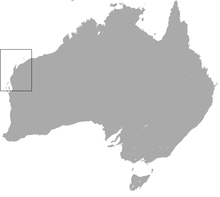Rufous hare-wallaby
The rufous hare-wallaby (Lagorchestes hirsutus) is a small wallaby found in Australia. It is also known by its Western Desert name mala. It used to be found widely across the western half of Australia, but is now only found in Bernier and Dorre Islands in Shark Bay.[3] It is currently classified as a vulnerable species.[2]
| Rufous hare-wallaby[1] | |
|---|---|

| |
| Mammals of Australia, Vol. II Plate 57 | |
| Scientific classification | |
| Domain: | Eukaryota |
| Kingdom: | Animalia |
| Phylum: | Chordata |
| Class: | Mammalia |
| Infraclass: | Marsupialia |
| Order: | Diprotodontia |
| Family: | Macropodidae |
| Genus: | Lagorchestes |
| Species: | L. hirsutus
|
| Binomial name | |
| Lagorchestes hirsutus Gould, 1844
| |

| |
| Rufous hare-wallaby range (blue — native, red — introduced) | |
The rufous hare-wallaby is a nocturnal herbivore that eats herbs, leaves and seeds. It is usually solitary, meaning that it lives alone. The species was first described by John Gould in The Mammals of Australia (1844). It is currently being reintroduced to mainland Australia, to the Tanami Desert in the Northern Territory.[3] Four distinct groups of this species have been described as subspecies:[2]
- Lagorchestes hirsutus hirsutus, now extinct
- Lagorchestes hirsutus bernieri, only found on Bernier Island
- Lagorchestes hirsutus dorreae, only found on Dorre Island.
- The fourth is an unnamed subspecies that is extinct in the wild. It was originally discovered in the Tanami Desert, and was once widespread across the centre of Australia. The only existing members of this group have been moved to conservation reserves in Western Australia.
The mala is a common totem in Western Desert Aboriginal Dreamings.[4]
References
change- ↑ Groves, Colin (2005). Wilson, D. E.; Reeder, D. M. (eds.). Mammal Species of the World (3rd ed.). Johns Hopkins University Press. p. 63. ISBN 0-801-88221-4.
- ↑ 2.0 2.1 2.2 Richards, J.; Morris, K.; Friend, T. & Burbidge, A. (2008). "Lagorchestes hirsutus". IUCN Red List of Threatened Species. 2008. Retrieved 28 December 2008.
- ↑ 3.0 3.1 Menkhorst, Peter (2001). A Field Guide to the Mammals of Australia. Oxford University Press. p. 108. ISBN 978-0-19-550870-3.
- ↑ Mala Reintroduction Factsheet. environment.gov.au
Other websites
changeMedia related to Lagorchestes hirsutus at Wikimedia Commons
